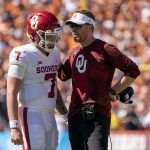As the Pac-12 formulates a strategy for its upcoming media rights negotiations, one component seems clear: Eliminating football night games altogether isn’t realistic — or smart.
Instead, the conference is focused on an issue that doesn’t receive as much attention as the late kickoffs: Reducing the number of six- and 12-day selection windows for its TV partners.
“That’s a high priority for us,” said a source with knowledge of the Pac-12’s negotiating strategy.
“We need to find the right windows for the right games, specifically for football but generally for all sports.”
That strategy is far easier to plot than to execute, however, and the conference could end up with some version of the current process once the next media contract cycle begins in the fall of 2024.
Ultimately, the Pac-12 presidents and chancellors must approve whatever preliminary deals commissioner George Kliavkoff strikes at the negotiating table.
With the six- and 12-day selection windows as with the night games, there are important financial and exposure considerations.
“One of the things (former commissioner) Larry Scott got right was the 10 p.m. Eastern window,” an industry source said. “It has to continue to exist for the Pac-12. It has never been more valuable.”
The scheduling process with Fox and ESPN, in place since 2012, unfolds in two stages:
— In late May or early June, kickoff times for the first three weeks of the season (and any weeknight games) are announced.
— Once the middle of September arrives, ESPN, Fox and the Pac-12 Networks begin a weekly draft.
In most cases, kickoff times are announced two Mondays before the game.
But ESPN and Fox have four six-day selection options (two per network) that can be deployed at their preference. In those instances, the start times aren’t set until the Sunday before the game.
While many Pac-12 fans recoil at the thought of 7:30 p.m. PT games, the larger issue is not knowing until a week or two before kickoff whether the game will start at 12 p.m. or 7:30 p.m. or anytime in between.
The late games would be more palatable if fans could plan several weeks, if not months, in advance.
“We’d like to move away from it, but that’s something we have to discuss with our partners,” the source said of the six- and 12-day selection process.
“There might be some creative ways to thread the needle.”
The challenge for Kliavkoff and the presidents is striking the right balance.
By waiting until a week or two before kickoff, ESPN and Fox can select the best matchups — and they are willing to pay for the flexibility.
But network cash isn’t the only consideration for the conference.
Ticket sales, full stadiums and fan satisfaction matter, too. All three are more easily achieved if the start times are set well in advance.
It’s extremely unlikely that every kickoff time will be set before the season begins. But a modified, fan-friendlier version of the current process could emerge from the upcoming negotiations.
“The feedback we’ve gotten,” the source said, “is that the six- and 12-day windows are a bigger issue than the night games themselves.”
Related posts:
 Wilner Hotline – Thanksgiving Day Pac-12 Doings
Wilner Hotline – Thanksgiving Day Pac-12 Doings

Oklahoma head coach Lincoln Riley . (AP Photo/Jeffrey McWhorter)
Wilner Hotline – Lincoln Riley To USC Sends Shock Waves Through Pac-12
UCLA guard Jaime Jaquez Jr. (24)(AP Photo/José Luis Villegas)
A quiet NBA Draft awaits the Pac-12, which speaks volumes about the state of the conference Pac-12 survival: Time for commissioner George Kliavkoff and the presidents to take swift, bold action (i.e., the “Costanza plan”)
Pac-12 survival: Time for commissioner George Kliavkoff and the presidents to take swift, bold action (i.e., the “Costanza plan”)
Jon Wilner
Jon Wilner has been covering college sports for decades and is an AP top-25 football and basketball voter as well as a Heisman Trophy voter. He was named Beat Writer of the Year in 2013 by the Football Writers Association of America for his coverage of the Pac-12, won first place for feature writing in 2016 in the Associated Press Sports Editors writing contest and is a five-time APSE honoree.